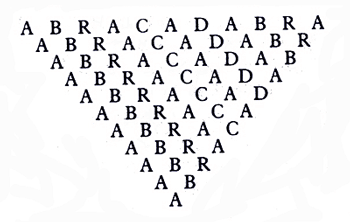Abracadabra
(the origins and more recent usage as a term used in the performances of prestidigitation or "magic")
A magical charm or incantation having the power to ward off disease or disaster and foolish or unintelligible talk.
Cabbalistic (cabalistic, kabbalistic) charm: mysterious or esoteric; as in, "The cabalistic teachings of the alchemists." The term cabala, kabbalah, or cabbala is said to come from a body of mystical Jewish teachings based on an interpretation of hidden meanings in the Hebrew Scriptures.
It came from early 16th century via medieval Latin, ultimately from rabbinical Hebrew gabbalah, "tradition", from giggel, "to receive, accept". The underlying idea is "something received or handed down".
A cabbalistic charm, said to be made up from the initials of the Hebrew words Ab, "Father", Ben, "Son", and Rukach ACadsch, "Holy Spirit"; and formerly used against agu, flux, toothache, etc.
The word was written on parchment as shown below and hung from the neck by a linen thread.
One of the few words entirely without meaning, this confusing term is still used in a joking way by those making "magic." It was first mentioned in a poem by Quintus Severus Sammonicus in the second century.
A cabalistic word intended to suggest infinity, abracadabra was believed to be a charm with the power to cure toothaches, fevers, and other ills, especially if written on parchment in a triangular arrangement and suspended from the neck by a linen thread. Abracadabra is of unknown origin, though tradition says it is composed by the initials of the Hebrew words Ab, "Father", Ben, "Son", and Ruach Acadsch, "Holy spirit". When a toothache strikes, inscribe a parchment amulet in the following triangular form:

The word was a holy word of a sect known as Gnostics, an early Christian group that combined religion with witchcraft. The word they used was abrasadabra. Some etymologists have guessed that it was simply an elongation of the name of their high priest, Abrasax.
Other word investigators have speculated that the beginning letters of three Hebrew words were loosely assembled to create this mystic term: ab, "father"; r'eb, "son"; cadosh, "holy spirit".
All of the sources seem to indicate that there is no unanimity as to the origins of the word abracadabra except that it has been used by "magicians" as a mystical aid to the success of their hocus-pocus.
- Word History: "Abracadabra," says the magician, unaware that at the time the thing to do with the word was wear it, not say it. Abracadabra was a magic word, the letters of which were arranged in an inverted pyramid [see image above] and worn as an amulet around the neck to protect the wearer against disease or trouble.
One fewer letter appeared in each line of the pyramid, until only a remained to form the vertex [highest point, apex] of the triangle. As the letters disappeared, so supposedly did the disease or trouble. While magicians still use abracadabra in their performances, the word itself has acquired another sense, "foolish or unintelligible talk."
- A word spoken by magicians and conjurors supposedly to ensure the success of a trick.
Deliberately nonsensical language [Mid-16thC. Via Latin from, ultimately, Greek, possibly from abraxas, a series of letters with the value 365 (the days of the year) in numerological theory. Originally a cabbalistic word and formerly used as a talisman or charm against fever].
You can find other word histories here.
